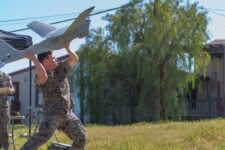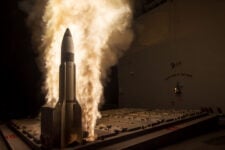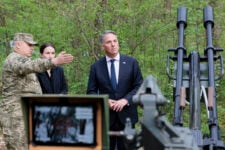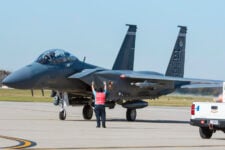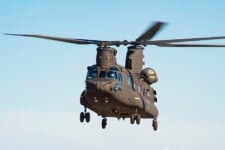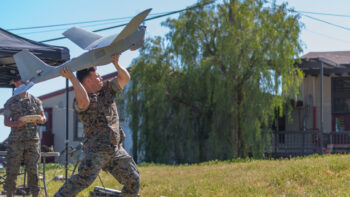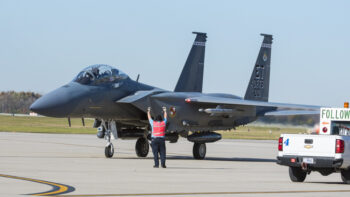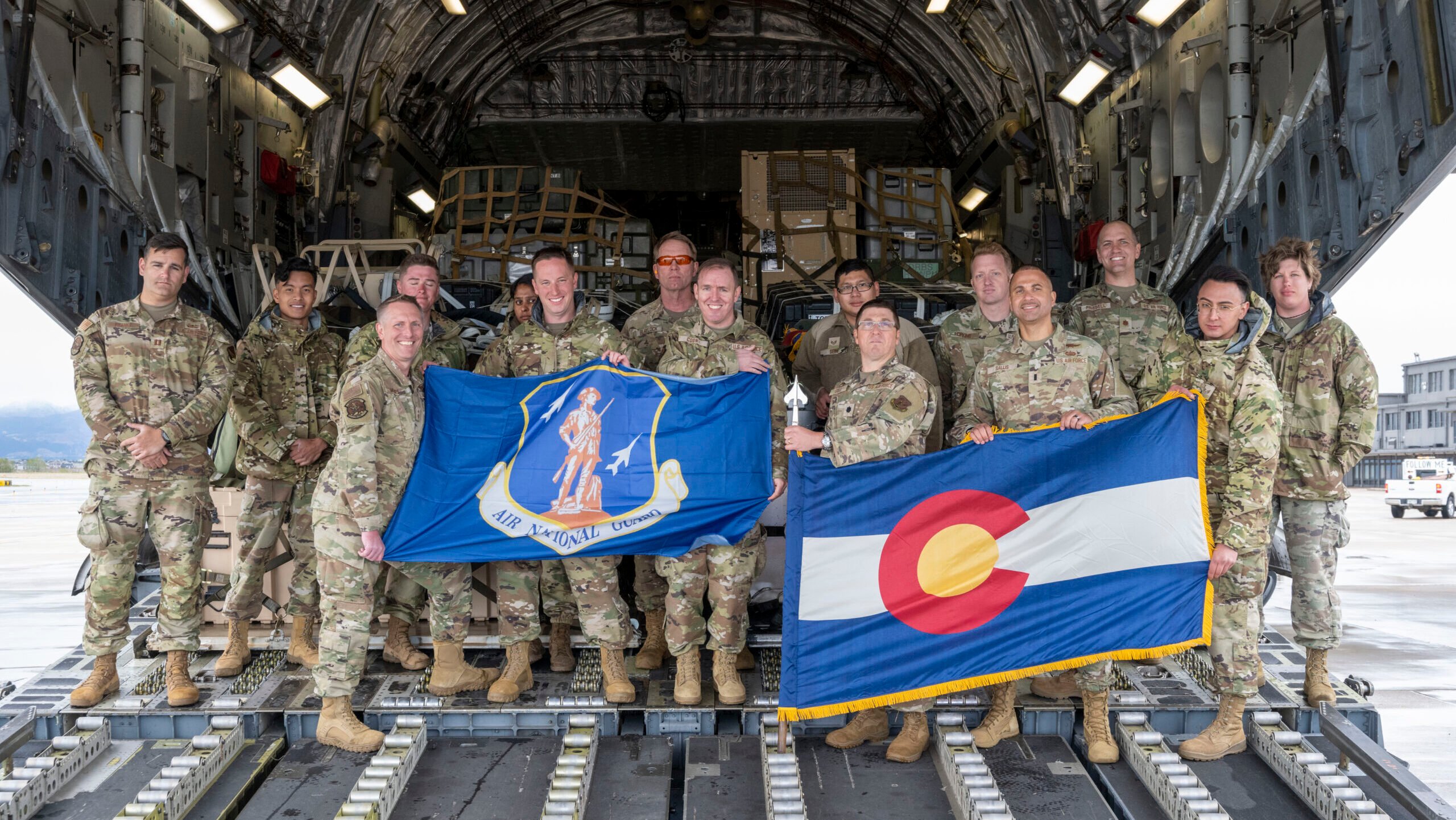
Airmen from the 138th Space Control Squadron, Peterson Air Force Base, Colorado Air National Guard, prepare to depart for a temportary duty from Peterson AFB to Washington, D.C. via an F-18 Globemaster courtesy of the 183rd Airlift Squadron, Missisipi Air National Guard on May 11, 2023 (U.S. Air National Guard photos by Tech. Sgt. Chance Johnson)
Since the creation of the Space Force, there has been an open question about how it will work with the National Guard. The latest turn in the saga came with an Air Force legislative proposal that transfer National Guard units doing space missions into the Space Force itself. In this new op-ed, Francis McGinn, the head of the National Guard Association of the United States, argues this would be a mistake.
The Department of the Air Force has developed a legislative proposal representing an existential threat to the National Guard as a whole, and Congress must act to stop it.
Legislative Proposal 480, currently circulating in draft form on the Hill, would forcibly strip Air National Guard units performing space missions away from their states and transfer them into the US Space Force without the consent of their respective governors.
This move represents a significant federal overreach that should concern governors and federal lawmakers alike. This is an attempt to bypass the longstanding authority Congress gave to governors requiring their consent before any National Guard units can be removed from their states.
The primary cause for concern is a provision within the proposal which circumvents two existing laws providing governors authority over their National Guard units. The proposal states the transfer of units “shall occur without regard to” those laws — effectively asking Congress to ignore the laws it created.
RELATED: Transfer of Air National Guard units to Space Force would be a one-off, says Air Force Secretary
It is the equivalent of asking the government for permission to rob your neighbor by asking legislators to ignore laws against robbery. Such a ham-fisted approach is legally dubious at best and a breach of the established legislative process.
Why is the Department of the Air Force pursuing such an aggressive strategy? Because leaders know the governors who oversee those units would never agree to having them stripped away.
Gov. Jared Polis of Colorado, whose state is home to several Air National Guard space units, made his objections to the proposed transfer clear in a recent letter to Secretary of Defense Lloyd Austin.
“This proposal’s enactment would not only have substantial negative effects to national security but would also have broader detrimental philosophical implications to the very role of the national guard, gubernatorial authority therein, and the continued existence of state-based citizen servicemembers,” Polis wrote.
The governor’s concerns are understandable, considering National Guard units are under the authority of their respective governors, unless activated by the president. This is a longstanding legal tradition our nation has followed for more than 120 years. Simply ignoring established law because it is inconvenient to the Department of the Air Force is unacceptable.
Federal lawmakers should also be concerned. After all, it was Congress who recognized the wisdom of granting governors authority over their respective Guard units in the first place. The Department of the Air Force is exhibiting a disregard for members of Congress and the American people they represent. Should Congress pass the proposal, we could well see the Pentagon try to use this new precedent as an excuse to chip away at other National Guard missions and consolidate power without regard for Congressional authority.
The Space Force will argue it needs to transfer Air National Guard space assets because their mission is inherently federal. This exhibits a fundamental misunderstanding of the National Guard, whose primary mission is to serve as the combat reserve of the Army and Air Force.
National Guard members meet the same standards and requirements as their active-duty counterparts to fulfill that mission. They answered the call for more than 20 years during the Global War on Terror, deploying regularly alongside their active-duty brothers and sisters. There is no reason to believe they won’t continue to meet that obligation.
Under the proposal, Guard space professionals could transfer to full-time active duty when their units shift to the Space Force, but that is a fundamental misunderstanding of why men and women join the National Guard. While a few might accept the move, most of our members joined the Guard to serve while maintaining a civilian life and won’t be looking to become full-time Guardians. The reality is that the Space Force will inherit largely empty units under this scheme, a bureaucratic coup that may net them extra positions on paper but which will actually leave America with weaker national security.
Fortunately for Congress, there is an alternative to the Air Force’s aggressive action: passing the Space National Guard Establishment Act. This simple and cost-effective solution would unite Air National Guard space units with the Space Force using existing personnel and infrastructure —all for the cost of about $250,000, according to the National Guard Bureau.
National Guard Bureau estimates say the Air Force’s plan could take nine years and cost as much as $1 billion. It would decimate the units in the process, creating a significant capability gap at a time we can’t afford it. It also sets a dangerous new standard.
Today, the Space Force wants to take away Air National Guard space units, but tomorrow it could be the Air Force taking away National Guard fighter squadrons or the Army taking over Army National Guard armor units. Congress must stop the Air Force’s proposal in its tracks for the good of the National Guard, our Constitution, and our national security.
Francis M. McGinn is the president of the National Guard Association of the United States, the nation’s oldest military service organization. He served in the military for four decades, predominantly with the Massachusetts National Guard where he previously held the position of assistant adjutant general-Army.
Marines new ‘Fusion Center’ aimed transitioning cutting edge tech more smoothly
Marine Corps officials said the new office will act as a bridge over the Pentagon’s infamous “valley of death” and will first focus on counter-drone systems.
